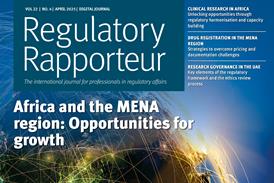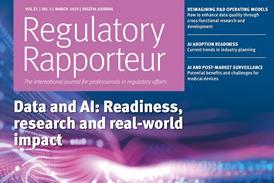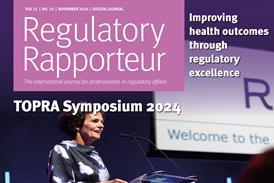Pharmaceuticals – Page 9
-
 Journal
JournalPart 1: EU reclassification (Rx to OTC switch) regulatory framework – what are the key challenges for industry and how might these be overcome?
Rx to OTC switch is the regulatory process that medicines must go through before they can be purchased in a pharmacy or shop without a prescription. This research investigated the challenges faced by the pharmaceutical industry with this process in the European Union and proposes where improvements could be made. It is important for consumers to have direct access to medicines without a prescription as this allows time for doctors to focus on more urgent care needs. This emphasis on consumer “self-care” is even more important now, during a pandemic, when face-to- face consultations with doctors have reduced.
-
 Focus
FocusData governance as a strategic imperative for regulatory compliance
Data governance is a multi-faceted arrangement that relies on data quality, data integrity, data and document management, security and safe storage. It is critically important to companies and regulators as they evaluate product quality, the manufacturing process and the reliability of study data from non-clinical and clinical research. The integrity ...
-
 Journal
JournalExploring Amgen’s Project Orbis experience with sotorasib (Part 2)
On 28 May 2021, sotorasib (LUMAKRAS™/LUMYKRAS®), a novel, first-in-class, inhibitor of the RAS GTPase family became the first drug to be approved by the US Food and Drug Administration (FDA) to target Kirsten rat sarcoma proto-oncogene (KRAS) G12C, a target that was considered undruggable for 40 years. Sotorasib is indicated ...
-
 Journal
JournalCMC considerations for US biosimilars development
The US Biologics Price Competition and Innovation Act of 2009 (BPCI Act) provides an abbreviated licensure pathway for biosimilar products. This pathway brought the hope of lower cost biologics, perhaps similar to what was accomplished by generics for small molecule drugs. Twelve years have now passed since the BPCI Act and experience continues to be gained with biosimilars development…
-
 Journal
JournalA regulatory view on the change management process for medicinal products
An effective change control process is a critical part of good manufacturing practice (GMP), during the post-approval phase of a medicinal product’s lifecycle. This article reviews key aspects of the current EU and International Conference on Harmonisation (ICH) quality guidelines. The operational aspects of the change control process are explored and guidance is provided on how the strategic review of changes can avoid or minimise the regulatory impact.
-
 Focus
FocusRegulatory Framework for Platform Technologies
Several novel manufacturing technologies and platforms, for example, messenger ribonucleic acid (mRNA) platform, synthetic DNA (doggybone (dbDNA)) platform, have recently emerged to produce vaccines and advanced therapy medicinal products (ATMPs) for human use. However, the regulatory framework for such platform technologies is not fully developed. There is significant interest in utilising platform approaches for drug development and for the commercial production of human medicines. Thus, some form of regulatory guidance and pathway, similar to the EU platform technology master le (PTMF) system that is used in the regulatory approval of veterinary vaccines, would benefit the human vaccines industry.
-
 Focus
FocusGene therapy products: regulatory expectations and challenges for industry
As the technology behind gene therapy products continues to evolve, applicants face the challenge of adapting their programmes to increasingly demanding and detailed regulation. This article provides an overview of current regulatory expectations and the challenges they may present to industry.
-
 Journal
JournalA review of paediatric development challenges, FDA collaboration and future trends
Susan McCune M.D. Susan McCune M.D., is a paediatrician and neonatologist, with 18 years’ academic clinical and research experience. This was followed by 18 years at the US FDA where, from 2017 to 2021, she was the director of the Office of Pediatric Therapeutics in the Office ...
-
 Focus
FocusThe EU restriction proposal for intentionally-added microplastics: A focus on solid dosage form medicinal products and food supplements
Among the European initiatives to address the growing concern of plastics in the environment, the European chemicals agency (ECHA) has prepared a restriction proposal for intentionally-added microplastics amid concerns about plastics in the environment. An introduction to the proposal and its impact on consumer products.
-
 Journal
JournalBrexit: The regulatory landscape one year on
A year since the UK departed from the EU, what has changed? The UK has started to depart from the EU in a number of different ways. This article will explore what has changed, how it came about and what to look out for as the relationship between the UK and EU, as well as the rest of the world, continues to evolve.
-
 Journal
JournalNavigating the regulatory landscape for regenerative medicines in Japan
This is the final article in a series of three that critically analyse the differences and similarities between the regulation of advanced therapy medicinal products (ATMPs), also known as regenerative medicines…[1],[2]
-
 Focus
FocusThe impact of the Northern Ireland Protocol on human medicines
Since the UK’s exit from the EU, the pharmaceutical industry has sought guidance on how this would impact the registration and supply of medicines, both in the UK and the EU. In addition, the publication of the Northern Ireland Protocol has added additional complexities, with a major impact on the ...
-
 Focus
FocusBrexit − Regulatory and supply chain considerations
The UK formally left the EU on 31 January 2020 and the transition period, as set out in the withdrawal agreement, came to an end on 31 December 2020. During this transition period, the UK continued to remain under EU pharmaceutical law. From 1 January 2021, the UK adopted an ...
-
 Focus
FocusPharmacovigilance regulations post-Brexit
The UK (Great Britain and Northern Ireland) has left the EU and the Brexit transition period has passed. This article covers points to consider when ensuring that pharmacovigilance systems for human medicinal products are compliant with EU and UK requirements. The UK requirements largely mirror the existing EU pharmacovigilance (PV) ...
-
 Journal
JournalSelection and justification of regulatory starting materials
A regulatory starting material (RSM) is the registered point at which drug substance manufacturing under good manufacturing practice (GMP) begins. RSMs are defined, isolated materials that are required to meet the general principles outlined in ICH Q11. This article provides guidance for small molecules in selecting and justifying starting materials from a risk-based perspective.
-
 Focus
FocusTime is running out for the rare pediatric disease designation and priority review voucher programs
Since 2012, the rare paediatric disease priority review voucher (RPD PRV) program in the US, provides incentives to promote research in leftover orphan paediatric disease...
-
 Focus
FocusConditional oncology drug approvals: A sponsor’s perspective on the evolving landscape of FDA accelerated approvals
The FDA’s accelerated approval (AA) pathway is an important regulatory mechanism that allows patients with serious or life-threatening conditions, potentially earlier access to treatments than under a standard, regular approval development pathway...
-
 Journal
JournalRequirements for the good distribution practice of medicinal products
No standardisation or formal educational framework to practice as a Responsible Person (RP) currently exists across EU countries. The current RP educational and work experience requirements in EU member states are discussed. (Note that the study was conducted before the UK left the EU, so it is included here among the EU member states.)
-
 Focus
FocusA regulatory lens on an industry imperative: Diversity in clinical research
Although clinical research is evolving alongside new technological advances, the inclusion of diverse populations within clinical trials has been slow. Regulatory professionals are essential stakeholders in the quest for ensuring inclusivity of these groups…
-
 Journal
JournalNonclinical immunogenicity evaluation in toxicology studies of biopharmaceuticals
One of the critical features that determines the clinical efficacy and safety of biotherapeutics, especially therapeutic proteins, is their ability to induce formation of antibodies against themselves. However, the clinical outcome cannot be predicted using the immunogenicity data from nonclinical studies…



















